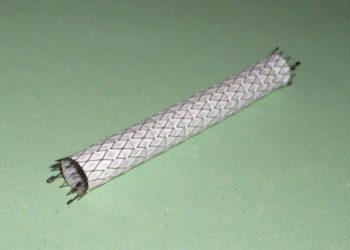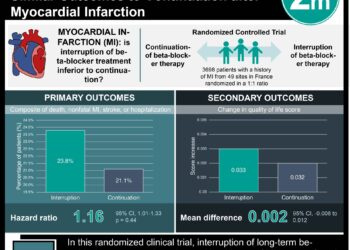Treatment with Percutaneous Coronary Intervention versus Coronary Artery Bypass not associated with increased rate of memory decline in older adults
1. Rate of age-related memory decline did not significantly differ when comparing individuals over the age of 65 who underwent percutaneous coronary intervention (PCI) versus coronary artery bypass grafting.
2. Coronary artery bypass grafting that involved the use of a cardiopulmonary bypass pump was associated with a greater rate of memory decline versus PCI, while bypass without pump was not.
Evidence Rating Level: 2 (Good)
Study Rundown: The mainstay of ischemic coronary artery disease treatment is currently either surgical treatment with coronary artery bypass grafting (CABG), or non-surgical treatment with percutaneous coronary intervention (PCI). CABG treatment traditionally involves the use of a cardiopulmonary bypass machine, however due to its harmful neurological and renal side-effects, a method to perform CABG that does not involve one was developed (off-pump CABG). PCI is also purposed not to have the same possible harmful side effects as CABG that uses a bypass machine, due to PCI avoiding the use of general anesthesia and surgical trauma. It is still relatively unclear however, if these hypotheses are correct. This study was done to determine the rate of age-related memory decline in patients who were treated with PCI or CABG, and if the use of a cardiopulmonary bypass machine influences age-related memory decline. The study consisted of using 1680 participants over the age of 65 who were registered in the national health and retirement study (HRS) and have underwent either a CABG or PCI procedure. The study was divided into 1015 individuals who had a PCI performed and 665 individuals who had a CABG performed. When comparing post-treatment memory decline values between groups, the rate of memory decline between the two groups did not significantly differ from each other. However, there was a significant difference between the rate of memory loss between 168 individuals who were treated with off-pump CABG versus PCI. The study’s results are limited however, as the off-pump CABG had a relatively small sample size compared to the main cohort. The study also used a statistically significant value of 1 standard deviation, however this value has not been formally established as clinically important. The study did however perform an extensive characteristic analysis, showing the groups’ populations were similar in many variables which impact neurological function.
Click to read the study in JAMA
Click to read an accompanying editorial in JAMA
Relevant Reading: Cognitive and Cardiac Outcomes 5 Years After Off-Pump vs On-Pump Coronary Artery Bypass Graft Surgery
In-depth [Retrospective cohort]: This retrospective cohort study consisted of analyzing HRS participant data from 1992-2010 who have underwent a PCI or CABG to determine if there is a significant difference in memory loss associated with these treatments. Memory loss was assessed by using HRS memory score which was developed by calibrating core HRS cognition questionnaire items against the 1995 HRS study sample. Memory score decline was declared statistically significant if it declined by a standard deviation of 1 or 0.048 memory units/year, as 95% of cases in this study fell between -0.93 to 1.50. The study consisted of 1015 PCI participants and 665 CABG participants. Inverse probability-weighted cohort analysis showed groups were similar in BMI, smoking status, hypertension status, diabetes, depressive symptoms, pain, prior stroke, partnered status, level of education, race/ethnicity distribution, and percentage of wealth greater than cohort median. CABG group had a mean age of 74.8 years and a 65.8% male population. PCI group had a mean age of 75 years and a 54.4% male population. Memory tests were elicited 3 years prior to procedures and 5 years after procedures. Memory scores showed that the PCI experimental group had a mean age-related memory decline of 0.064 memory units (95% CI, 0.052 to 0.078) before treatment and a mean age-related memory decline of 0.060 memory units (95% CI, 0.048 to 0.071) after treatment. The CABG group had similar rates of memory decline with a mean memory decline of 0.049 memory units/year (95% CI, 0.033 to 0.065) before treatment and 0.059 memory units/year (95% CI, 0.047 to 0.072) after treatment. Subtracting the two non-rounded values yielded a memory units/year difference of less than 0.001, indicating memory loss between CABG and PCI participants occurred at approximately the same rate (p=0.98)When calculating off-pump CABG memory decline, results show an after-treatment memory decline of 0.074 memory units/year (95% CI, 0.052 to 0.096). When subtracting the highest end of the 95% confidence interval of off-pump CABG to the lowest end of the 95% confidence interval of PCI, it showed a memory unit/year of 0.046 memory units/year (95% CI, 0.008 to 0.084) which was statistically significant, as it was more than the 1 standard deviation limit. This study therefore indicates that there is no significant difference in the rate of age-related memory decline after PCI vs. CABG, but one after off-pump CABG vs. PCI.
Image: PD
©2021 2 Minute Medicine, Inc. All rights reserved. No works may be reproduced without expressed written consent from 2 Minute Medicine, Inc. Inquire about licensing here. No article should be construed as medical advice and is not intended as such by the authors or by 2 Minute Medicine, Inc.






